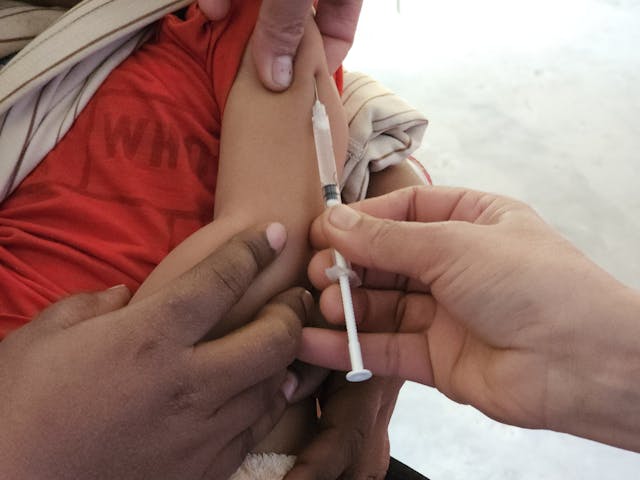Baby Vaccination Schedule. What Parents Need to Know

Baby Vaccination Schedule: What Parents Need to Know and Essential Tips
Vaccinations are a cornerstone of preventive healthcare, protecting babies from severe and potentially life-threatening illnesses. For new parents, understanding the baby vaccination schedule is crucial. This guide breaks down the importance of vaccines, the recommended schedule, and practical tips to make the process smoother.
Why Are Vaccines Important for Babies?
Vaccines play a vital role in safeguarding your baby’s health by:
- Preventing Diseases
Vaccines protect against diseases like measles, mumps, polio, and whooping cough, which can have serious complications. - Building Immunity
Vaccinations help your baby develop immunity by introducing a weakened or inactive part of the pathogen, enabling the immune system to recognize and fight it in the future. - Community Protection
When most people are vaccinated, herd immunity protects those who cannot be vaccinated, such as newborns or individuals with weakened immune systems.
Recommended Baby Vaccination Schedule
The vaccination schedule varies by country, but most follow guidelines set by organizations like the World Health Organization (WHO) or the Centers for Disease Control and Prevention (CDC). Below is a general outline of vaccines typically recommended during the first year of life:
- At Birth:
- Hepatitis B (1st dose)
- 2 Months:
- DTaP (Diphtheria, Tetanus, Pertussis)
- IPV (Inactivated Polio Vaccine)
- Hib (Haemophilus influenzae type B)
- Hepatitis B (2nd dose)
- PCV (Pneumococcal Conjugate Vaccine)
- Rotavirus
- 4 Months:
- DTaP
- IPV
- Hib
- PCV
- Rotavirus
- 6 Months:
- DTaP
- IPV
- Hib
- Hepatitis B (3rd dose)
- PCV
- Rotavirus
- 9 Months:
- Measles, Mumps, Rubella (MMR)
- Influenza (if flu season)
- 12 Months:
- MMR (if not given at 9 months)
- Varicella (Chickenpox)
- Hepatitis A (1st dose)
Frequently Asked Questions About Vaccination
- Are Vaccines Safe?
Yes, vaccines undergo rigorous testing before approval. Side effects are usually mild, such as fever or soreness at the injection site. Severe reactions are extremely rare. - What If My Baby Misses a Vaccine?
If a dose is missed, consult your pediatrician. They can help you catch up with the schedule without compromising effectiveness. - Can Babies Get Multiple Vaccines at Once?
Yes, combination vaccines are safe and reduce the number of injections required.
How to Prepare for Vaccination Day
- Understand the Vaccines
Research which vaccines your baby will receive and their potential side effects. Your pediatrician can provide detailed information. - Stay Calm and Comfort Your Baby
Babies can sense parental anxiety. Keep a calm demeanor to help your baby feel at ease. - Dress Your Baby Comfortably
Opt for loose clothing that allows easy access to the thighs or arms for injections. - Bring Comfort Items
A favorite toy, blanket, or pacifier can help soothe your baby during and after the vaccination.
After the Vaccination: What to Expect
Most babies experience mild side effects such as:
- Low-grade fever
- Fussiness or irritability
- Redness or swelling at the injection site
To manage these:
- Use a cool compress on the injection site to reduce swelling.
- Offer extra cuddles and comfort.
- Consult your doctor before giving any medication like acetaminophen.
If your baby shows signs of an allergic reaction, such as difficulty breathing, hives, or extreme drowsiness, seek medical attention immediately.
Practical Tips for Parents
- Keep a Record
Maintain a vaccination card to track your baby’s immunizations and ensure no doses are missed. - Schedule Smartly
Plan vaccinations during a time when your baby is well-rested and fed. Avoid scheduling on days when you anticipate other stressful events. - Stay Informed
Stay up to date with your country’s vaccination guidelines and ask your pediatrician any questions you may have. - Be Patient
Vaccination appointments may take time, especially if your baby is upset. Allow yourself extra time and stay patient.
Myths and Facts About Baby Vaccination
- Myth: Vaccines can cause autism.
Fact: Numerous studies have debunked this myth. Vaccines are safe and do not cause autism. - Myth: Natural immunity is better than vaccine-induced immunity.
Fact: While natural immunity can occur after an infection, the risks associated with the disease far outweigh the benefits. Vaccines provide safe immunity without severe illness. - Myth: Too many vaccines can overwhelm a baby’s immune system.
Fact: Babies encounter thousands of germs daily, and their immune systems can handle multiple vaccines effectively.
Why Sticking to the Schedule Matters
Timely vaccinations ensure that your baby is protected during the most vulnerable stages of development. Delaying vaccines can leave your child at risk of contracting preventable diseases.
Vaccination is a critical part of your baby’s health journey. By understanding the vaccination schedule and preparing for appointments, parents can ensure a smooth process for their little ones. Remember, your pediatrician is your best resource for any questions or concerns about vaccinations.











